人教版八年级上册 Unit 1 Where did you go on vacation?Section A 2d-3c 课件 (共33张PPT,无音频)
文档属性
| 名称 | 人教版八年级上册 Unit 1 Where did you go on vacation?Section A 2d-3c 课件 (共33张PPT,无音频) | 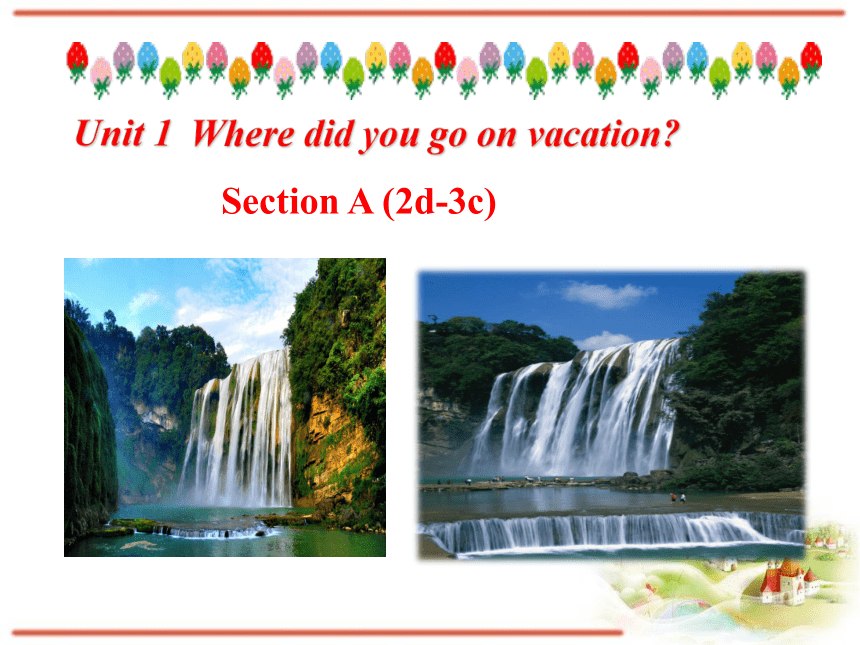 | |
| 格式 | zip | ||
| 文件大小 | 2.0MB | ||
| 资源类型 | 教案 | ||
| 版本资源 | 人教新目标(Go for it)版 | ||
| 科目 | 英语 | ||
| 更新时间 | 2022-09-02 22:09:46 | ||
图片预览



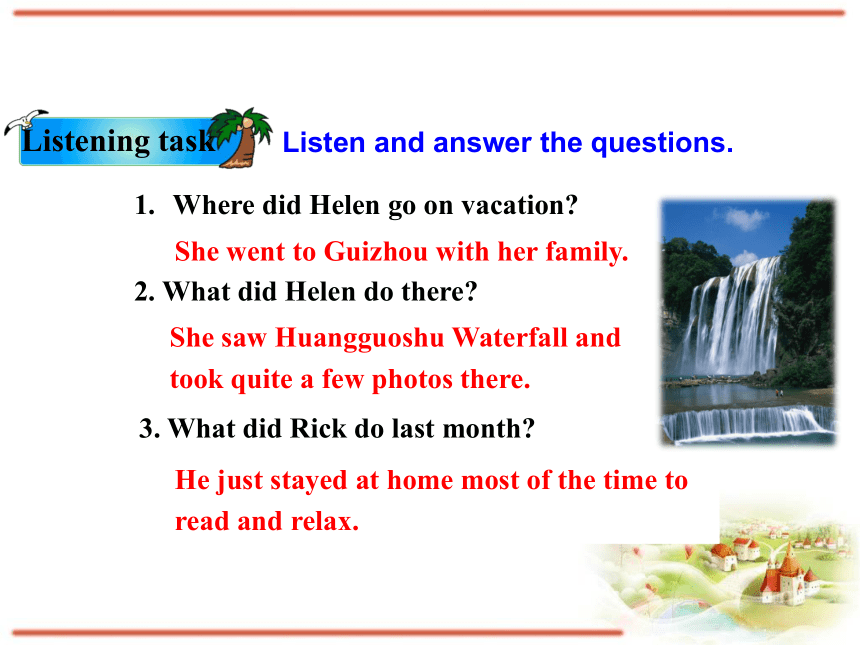
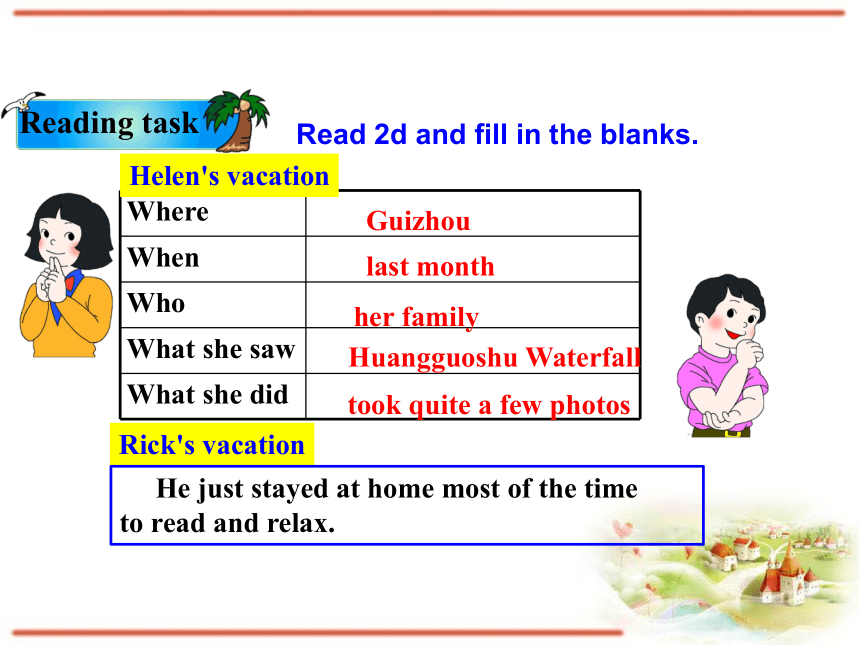
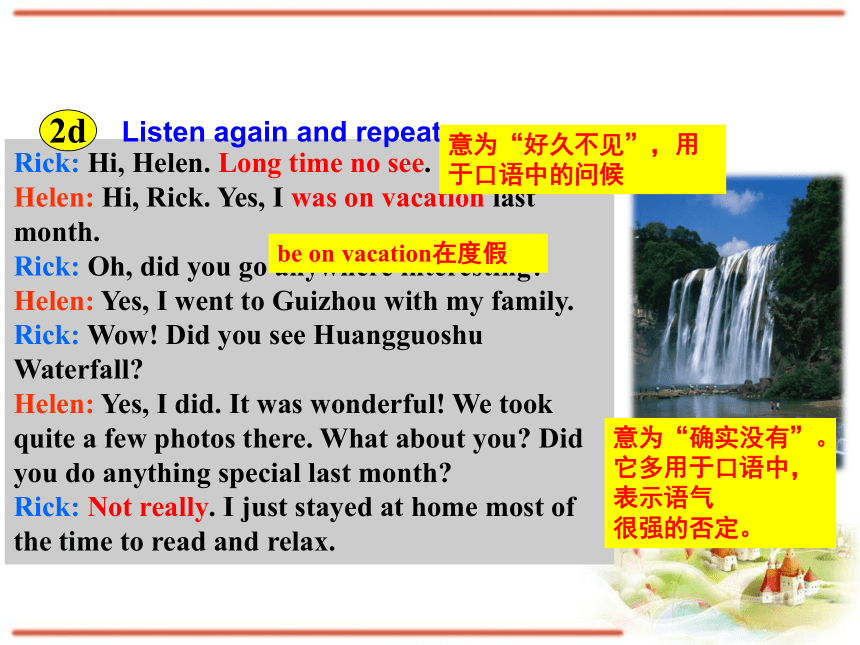
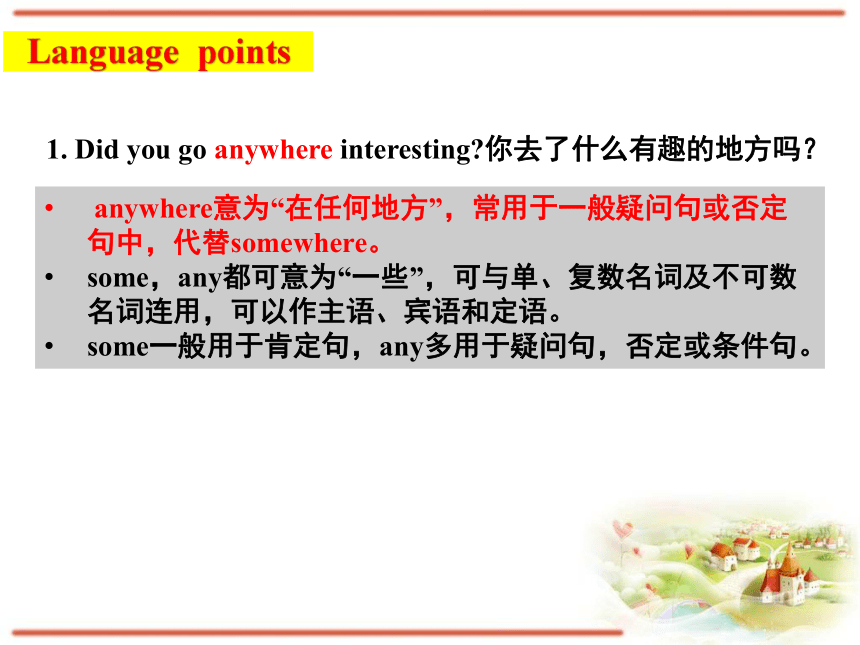
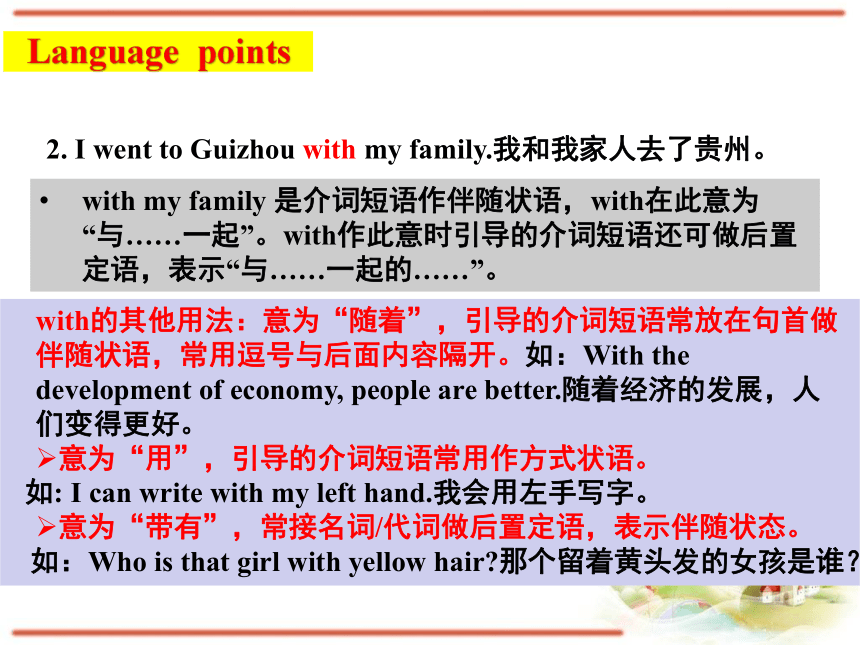
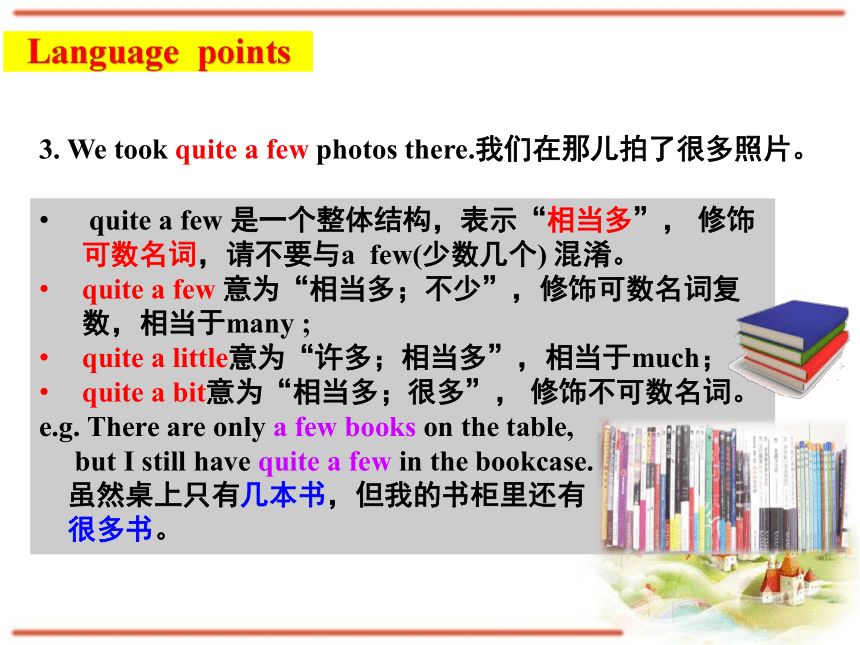
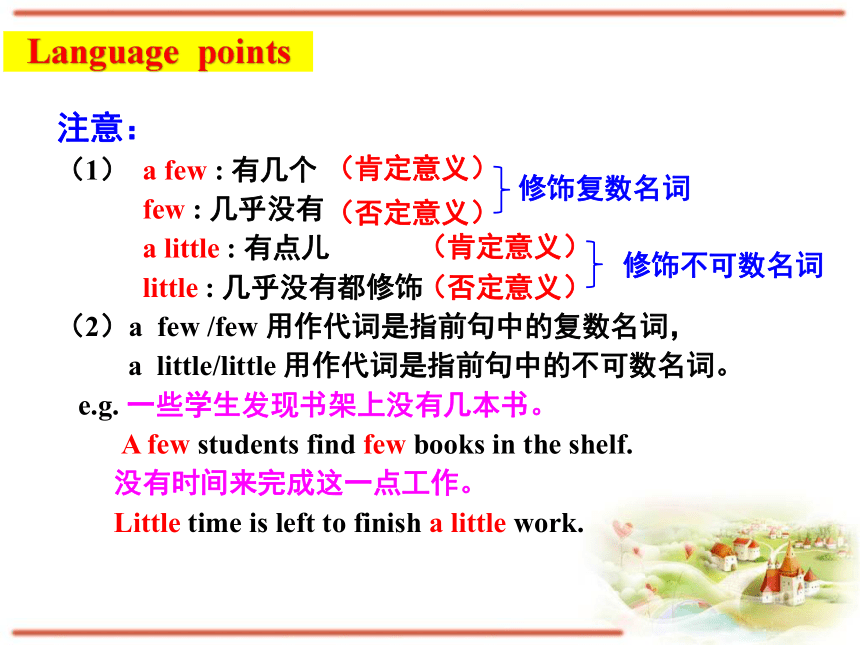
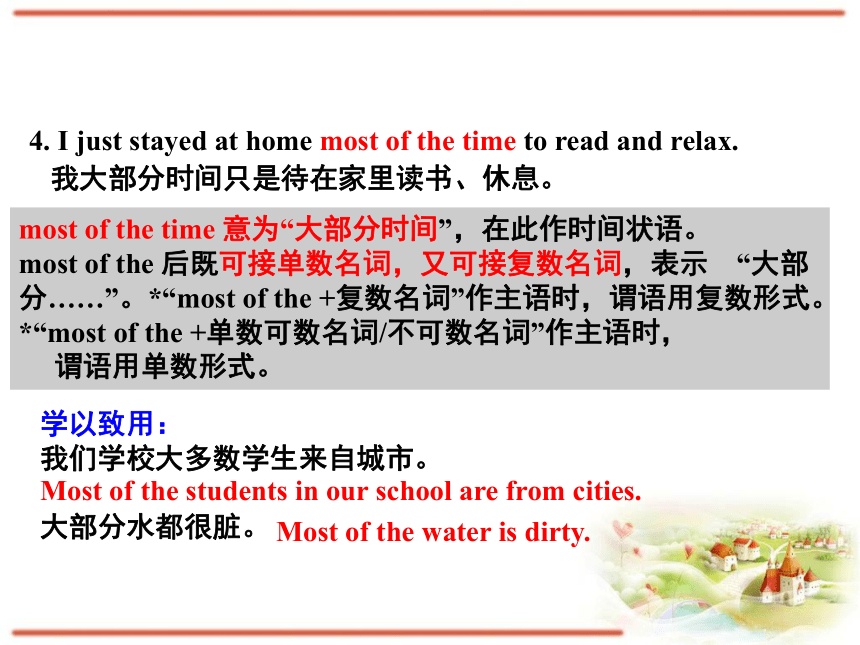
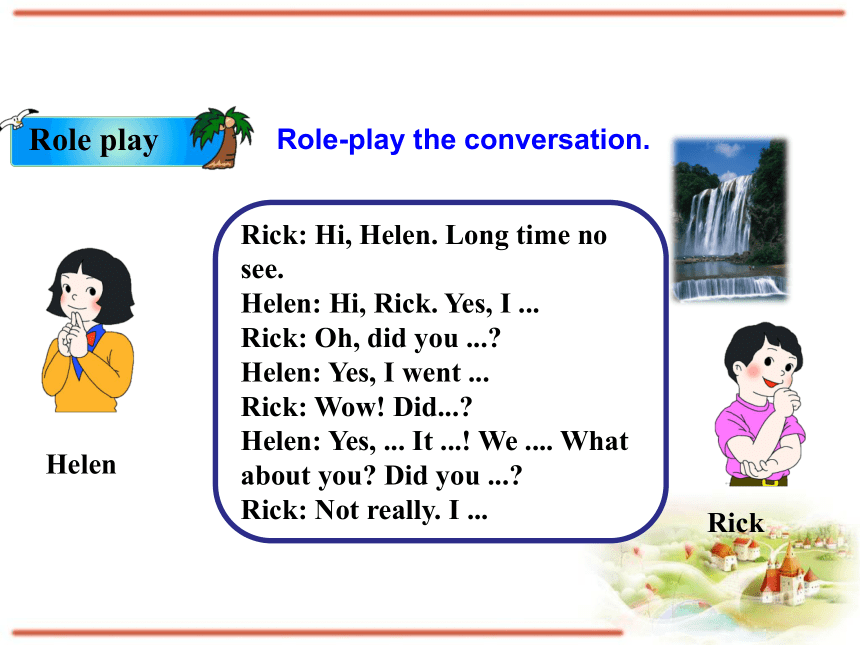
文档简介
(共33张PPT)
Unit 1 Where did you go on vacation
Unit 1 Where did you go on vacation
Section A (2d-3c)
0
Warming up
let’s enjoy a video!
Huangguoshu Waterfall is an interesting and wonderful place in Guizhou. You can see quite a few waterfalls in China, but Huangguoshu Waterfall is very special. It's special because it's great and beautiful .It's the biggest waterfall in China. People take a lot of photos of this waterfall and here are some.
Where did Helen go on vacation
2. What did Helen do there
3. What did Rick do last month
She went to Guizhou with her family.
She saw Huangguoshu Waterfall and took quite a few photos there.
He just stayed at home most of the time to read and relax.
Listen and answer the questions.
Listening task
Reading task
Where
When
Who
What she saw
What she did
Helen's vacation
Rick's vacation
He just stayed at home most of the time
to read and relax.
Guizhou
last month
her family
Huangguoshu Waterfall
took quite a few photos
Read 2d and fill in the blanks.
Rick: Hi, Helen. Long time no see.
Helen: Hi, Rick. Yes, I was on vacation last month.
Rick: Oh, did you go anywhere interesting
Helen: Yes, I went to Guizhou with my family.
Rick: Wow! Did you see Huangguoshu Waterfall
Helen: Yes, I did. It was wonderful! We took quite a few photos there. What about you Did you do anything special last month
Rick: Not really. I just stayed at home most of the time to read and relax.
2d
Listen again and repeat.
意为“好久不见”,用于口语中的问候
意为“确实没有”。它多用于口语中,表示语气
很强的否定。
be on vacation在度假
1. Did you go anywhere interesting 你去了什么有趣的地方吗?
anywhere意为“在任何地方”,常用于一般疑问句或否定句中,代替somewhere。
some,any都可意为“一些”,可与单、复数名词及不可数名词连用,可以作主语、宾语和定语。
some一般用于肯定句,any多用于疑问句,否定或条件句。
Language points
2. I went to Guizhou with my family.我和我家人去了贵州。
with my family 是介词短语作伴随状语,with在此意为“与……一起”。with作此意时引导的介词短语还可做后置定语,表示“与……一起的……”。
with的其他用法:意为“随着”,引导的介词短语常放在句首做伴随状语,常用逗号与后面内容隔开。如:With the development of economy, people are better.随着经济的发展,人们变得更好。
意为“用”,引导的介词短语常用作方式状语。
如: I can write with my left hand.我会用左手写字。
意为“带有”,常接名词/代词做后置定语,表示伴随状态。
如:Who is that girl with yellow hair 那个留着黄头发的女孩是谁?
Language points
3. We took quite a few photos there.我们在那儿拍了很多照片。
quite a few 是一个整体结构,表示“相当多”, 修饰 可数名词,请不要与a few(少数几个) 混淆。
quite a few 意为“相当多;不少”,修饰可数名词复数,相当于many ;
quite a little意为“许多;相当多”,相当于much;
quite a bit意为“相当多;很多”, 修饰不可数名词。
e.g. There are only a few books on the table,
but I still have quite a few in the bookcase.
虽然桌上只有几本书,但我的书柜里还有
很多书。
Language points
注意:
(1) a few : 有几个
few : 几乎没有
a little : 有点儿
little : 几乎没有都修饰
(2)a few /few 用作代词是指前句中的复数名词,
a little/little 用作代词是指前句中的不可数名词。
e.g. 一些学生发现书架上没有几本书。
A few students find few books in the shelf.
没有时间来完成这一点工作。
Little time is left to finish a little work.
修饰复数名词
(肯定意义)
(否定意义)
(肯定意义)
(否定意义)
修饰不可数名词
Language points
4. I just stayed at home most of the time to read and relax.
我大部分时间只是待在家里读书、休息。
most of the time 意为“大部分时间”,在此作时间状语。
most of the 后既可接单数名词,又可接复数名词,表示 “大部分……”。*“most of the +复数名词”作主语时,谓语用复数形式。
*“most of the +单数可数名词/不可数名词”作主语时,
谓语用单数形式。
学以致用:
我们学校大多数学生来自城市。
大部分水都很脏。
Most of the students in our school are from cities.
Most of the water is dirty.
Role play
Role-play the conversation.
Rick: Hi, Helen. Long time no see.
Helen: Hi, Rick. Yes, I ...
Rick: Oh, did you ...
Helen: Yes, I went ...
Rick: Wow! Did...
Helen: Yes, ... It ...! We .... What about you Did you ...
Rick: Not really. I ...
Helen
Rick
Role play
Role-play the conversation.
Rick: Hi, Helen. Long time no see.
Helen: Hi, Rick. Yes, I ...
Rick: Oh, did you ...
Helen: Yes, I went ...
Rick: Wow! Did...
Helen: Yes, ... It ...! We .... What about you Did you ...
Rick: Not really. I ...
Helen
Rick
Where did you go on vacation I went to New York City.
Did you go out with anyone No. No one was here. Everyone was on vacation.
Did you buy anything special Yes, I bought something for my father.
No, I bought nothing.
How was the food Everything tasted really good!
Did everyone have a good time Oh, yes. Everything was excellent.
Grammar Focus
语法重点 :1.复习巩固一般过去时
当句中有表示过去的时间状语时,谓语动词要用一般过去时。一般过去时常有的标志词:yesterday, the day before yesterday, the other day…ago, last night/ week/month,in+过去的年份等。
语法重点 :2.复合不定代词
复合不定代词被形容词、不定式、定语从句修饰时,它们必须放在这些代词之后。
动词的过去式
1. 表示过去某个时间发
生的动作或存在的状态。
2. 表示过去经常或反复发
生的动作。
yesterday
last night/week/time…
… days ago
on Sunday morning
一般过去时
一般过去时
用法
构成
常用时间
动词过去式的一般变化规则
1. 一般在动词词尾加ed
例: clean →cleaned
watch → watched
2. 以e 结尾的动词, 只加d
例: live → lived close → closed
3. 以辅音字母加y结尾的动词,
改y为i, 再加ed
例: study → studied
carry → carried
4. 末尾只有一个辅音字母的重读闭音节词,先双写这个辅音字母,再加-ed
例: stop → stopped
规则动词词尾加ed, 有三种读音:
1. 在清辅音后读作/t/
例: ask →asked
watch → watched
2. 在浊辅音、其他辅音和元音后读作/d/
例: clean → cleaned stay → stayed
3. 在t/d后面读作 /id/
例: want → wanted
visit → visited
常见的不规则动词过去式(详见课本最后一页不规则动词表)
am/ is → was are → were do → did
drink → drank make → made have → had
go → went get → got see → saw
take → took feed → fed ride → rode
肯定句:He was at home yesterday.
We were happy at the party.
否定句:He wasn’t at home yesterday.
We weren’t happy at the party.
疑问句:--Was he at home yesterday
--Yes, he was./No, he wasn’t.
系动词be的一般过去时
am (is) →was are →were
be动词
表过去存在的状态。
肯定句:主语+动词过去式+其它
I go to the movie. →I went to the movie.
否定句:主语+didn’t+动词原形+其它
I don’t go to school today. →
I didn’t go to school today.
一般疑问句:Did +主语+动词原形+其它
--Do you have breakfast
--Yes, I do./No, I don’t. →
--Did you have breakfast
--Yes, I did./No, I didn’t.
实义动词的一般过去时
行为动词
表过去发生的动作。
动词一般过去时, 表示过去发生事;
be用was或用were, have, has变had;
谓语动词过去式, 过去时间做标志;
一般动词加-ed, 若是特殊得硬记。
否定句很简单, 主语之后didn’t添;
疑问句也不难, did放在主语前;
如果谓语之前有did, 谓语动词需还原;
动词若是was, were, 否定就把not添。
巧记一般过去时
复合不定代词
1.定义:由some, any, no, every加上-one, -body, -thing构成复合代词。我们称之为复合不定代词。
somebody 某人 someone 某人 something 某物,某事 anybody 任何人
anyone 任何人
anything 任何事物
nobody 没有人 no one 没有人 nothing 没有东西 everybody 每人
everyone 每人
everything 每一件事情;一切
2.常见的复合不定代词
3.用法:
(1) 相当于名词,可作主语、宾语和表语,不做定语;作主语时谓语要用单数形式。
例: 今天我没有什么可讲的。
I have nothing to say today
世上无难事,只怕有心人。
Nothing is difficult if you put your heart into it.
没什么。
(作宾语)
(作主语)
That is nothing.
(作表语)
(2) somebody/someone/something一般用于肯定句,
而anybody/anyone/anything一般用于否定句、疑问句或条
件状语从句。
例:某人正在唱歌。
我们现在不能作出任何决定。
你要是需要什么,请给我打电话。
If you want anything, please call me.
Someone /Somebody is singing a song.
We can’t decide anything now.
(3)复合不定代词被形容词、不定式、定语从句修饰时,它们
必须放在这些代词之后。
例:There is nothing wrong with the machine.
这台机器有问题。
Do you want anything to drink.
你想喝点什么吗?
If there is anything I can do for you , tell me.
如果有什么我能帮你的,请告诉我。
Fill in the blanks with the words in the box and practice the conversation.
anyone, something, anything, everything , nothing
Linda: Did you do ________ fun on your vacation, Alice
Alice: yes, I did. I went to Sanya.
Linda: How did you like it
Alice: Well, it was my first time there. So __________ was
really interesting.
anything
everything
3a
How do/did you like… “你觉得……怎样?”,用来询问对方的观点或看法,相当于 What do you think of… 或How do you feel about…
Linda: Did you go with__________
Alice: Yes, I did. I went with my sister.
Linda: Did you go shopping
Alice: Of course! I bought _________ for my parents, but
__________ for myself.
Linda: Why didn’t you buy__________ for yourself
Alice: I didn’t really see _________ I liked.
anyone
something
anything
nothing
anything
anyone, something, anything, everything , nothing
Fill in the blanks in the e-mail message with the words in the box.
anything, everything, nothing, everyone, no one
Dear Bill,
How was your vacation Did you do _________ interesting Did ________ in the family go with you I went to a friend’s farm in the countryside with my family. ___________ was great.
anything
everyone
Everything
3b
We fed some hens and saw some baby pigs. They were so cute! The only problem was that there was _______ much to do in the evening but read. Still _________ seemed to be bored. Bye for now!
Mark
anything, everything, nothing, everyone, no one
nothing
no one
nothing much to do意为“没什么事可做”。I have nothing much to do this afternoon. 今天下午我没什么特殊的事可做。
拓展:nothing…but…意为“除……之外什么也没有;只有”。but后可接名词或动词原形。I had nothing to do but watch TV.
我无事可做,只有看电视。
Did you… Everyone Someone No one
eat anything at a restaurant
read anything interesting
visit anyone in your family
buy anything
keep a diary
Ask your group questions about their last vacation. Then tell the class your results.
3c
Report like this:
In our group, everyone ate something at a restaurant. No one reads anything interesting. Li Lei visits his grandparents in the town. Everyone buys something interesting. Xiang Hua keeps a diary.
Ask your classmates , then give us your
group result!
Homework
Do a report about your vacation with the tips in the chart。
Where
When
Who
What she saw
What she did
Goodbye!
Unit 1 Where did you go on vacation
Unit 1 Where did you go on vacation
Section A (2d-3c)
0
Warming up
let’s enjoy a video!
Huangguoshu Waterfall is an interesting and wonderful place in Guizhou. You can see quite a few waterfalls in China, but Huangguoshu Waterfall is very special. It's special because it's great and beautiful .It's the biggest waterfall in China. People take a lot of photos of this waterfall and here are some.
Where did Helen go on vacation
2. What did Helen do there
3. What did Rick do last month
She went to Guizhou with her family.
She saw Huangguoshu Waterfall and took quite a few photos there.
He just stayed at home most of the time to read and relax.
Listen and answer the questions.
Listening task
Reading task
Where
When
Who
What she saw
What she did
Helen's vacation
Rick's vacation
He just stayed at home most of the time
to read and relax.
Guizhou
last month
her family
Huangguoshu Waterfall
took quite a few photos
Read 2d and fill in the blanks.
Rick: Hi, Helen. Long time no see.
Helen: Hi, Rick. Yes, I was on vacation last month.
Rick: Oh, did you go anywhere interesting
Helen: Yes, I went to Guizhou with my family.
Rick: Wow! Did you see Huangguoshu Waterfall
Helen: Yes, I did. It was wonderful! We took quite a few photos there. What about you Did you do anything special last month
Rick: Not really. I just stayed at home most of the time to read and relax.
2d
Listen again and repeat.
意为“好久不见”,用于口语中的问候
意为“确实没有”。它多用于口语中,表示语气
很强的否定。
be on vacation在度假
1. Did you go anywhere interesting 你去了什么有趣的地方吗?
anywhere意为“在任何地方”,常用于一般疑问句或否定句中,代替somewhere。
some,any都可意为“一些”,可与单、复数名词及不可数名词连用,可以作主语、宾语和定语。
some一般用于肯定句,any多用于疑问句,否定或条件句。
Language points
2. I went to Guizhou with my family.我和我家人去了贵州。
with my family 是介词短语作伴随状语,with在此意为“与……一起”。with作此意时引导的介词短语还可做后置定语,表示“与……一起的……”。
with的其他用法:意为“随着”,引导的介词短语常放在句首做伴随状语,常用逗号与后面内容隔开。如:With the development of economy, people are better.随着经济的发展,人们变得更好。
意为“用”,引导的介词短语常用作方式状语。
如: I can write with my left hand.我会用左手写字。
意为“带有”,常接名词/代词做后置定语,表示伴随状态。
如:Who is that girl with yellow hair 那个留着黄头发的女孩是谁?
Language points
3. We took quite a few photos there.我们在那儿拍了很多照片。
quite a few 是一个整体结构,表示“相当多”, 修饰 可数名词,请不要与a few(少数几个) 混淆。
quite a few 意为“相当多;不少”,修饰可数名词复数,相当于many ;
quite a little意为“许多;相当多”,相当于much;
quite a bit意为“相当多;很多”, 修饰不可数名词。
e.g. There are only a few books on the table,
but I still have quite a few in the bookcase.
虽然桌上只有几本书,但我的书柜里还有
很多书。
Language points
注意:
(1) a few : 有几个
few : 几乎没有
a little : 有点儿
little : 几乎没有都修饰
(2)a few /few 用作代词是指前句中的复数名词,
a little/little 用作代词是指前句中的不可数名词。
e.g. 一些学生发现书架上没有几本书。
A few students find few books in the shelf.
没有时间来完成这一点工作。
Little time is left to finish a little work.
修饰复数名词
(肯定意义)
(否定意义)
(肯定意义)
(否定意义)
修饰不可数名词
Language points
4. I just stayed at home most of the time to read and relax.
我大部分时间只是待在家里读书、休息。
most of the time 意为“大部分时间”,在此作时间状语。
most of the 后既可接单数名词,又可接复数名词,表示 “大部分……”。*“most of the +复数名词”作主语时,谓语用复数形式。
*“most of the +单数可数名词/不可数名词”作主语时,
谓语用单数形式。
学以致用:
我们学校大多数学生来自城市。
大部分水都很脏。
Most of the students in our school are from cities.
Most of the water is dirty.
Role play
Role-play the conversation.
Rick: Hi, Helen. Long time no see.
Helen: Hi, Rick. Yes, I ...
Rick: Oh, did you ...
Helen: Yes, I went ...
Rick: Wow! Did...
Helen: Yes, ... It ...! We .... What about you Did you ...
Rick: Not really. I ...
Helen
Rick
Role play
Role-play the conversation.
Rick: Hi, Helen. Long time no see.
Helen: Hi, Rick. Yes, I ...
Rick: Oh, did you ...
Helen: Yes, I went ...
Rick: Wow! Did...
Helen: Yes, ... It ...! We .... What about you Did you ...
Rick: Not really. I ...
Helen
Rick
Where did you go on vacation I went to New York City.
Did you go out with anyone No. No one was here. Everyone was on vacation.
Did you buy anything special Yes, I bought something for my father.
No, I bought nothing.
How was the food Everything tasted really good!
Did everyone have a good time Oh, yes. Everything was excellent.
Grammar Focus
语法重点 :1.复习巩固一般过去时
当句中有表示过去的时间状语时,谓语动词要用一般过去时。一般过去时常有的标志词:yesterday, the day before yesterday, the other day…ago, last night/ week/month,in+过去的年份等。
语法重点 :2.复合不定代词
复合不定代词被形容词、不定式、定语从句修饰时,它们必须放在这些代词之后。
动词的过去式
1. 表示过去某个时间发
生的动作或存在的状态。
2. 表示过去经常或反复发
生的动作。
yesterday
last night/week/time…
… days ago
on Sunday morning
一般过去时
一般过去时
用法
构成
常用时间
动词过去式的一般变化规则
1. 一般在动词词尾加ed
例: clean →cleaned
watch → watched
2. 以e 结尾的动词, 只加d
例: live → lived close → closed
3. 以辅音字母加y结尾的动词,
改y为i, 再加ed
例: study → studied
carry → carried
4. 末尾只有一个辅音字母的重读闭音节词,先双写这个辅音字母,再加-ed
例: stop → stopped
规则动词词尾加ed, 有三种读音:
1. 在清辅音后读作/t/
例: ask →asked
watch → watched
2. 在浊辅音、其他辅音和元音后读作/d/
例: clean → cleaned stay → stayed
3. 在t/d后面读作 /id/
例: want → wanted
visit → visited
常见的不规则动词过去式(详见课本最后一页不规则动词表)
am/ is → was are → were do → did
drink → drank make → made have → had
go → went get → got see → saw
take → took feed → fed ride → rode
肯定句:He was at home yesterday.
We were happy at the party.
否定句:He wasn’t at home yesterday.
We weren’t happy at the party.
疑问句:--Was he at home yesterday
--Yes, he was./No, he wasn’t.
系动词be的一般过去时
am (is) →was are →were
be动词
表过去存在的状态。
肯定句:主语+动词过去式+其它
I go to the movie. →I went to the movie.
否定句:主语+didn’t+动词原形+其它
I don’t go to school today. →
I didn’t go to school today.
一般疑问句:Did +主语+动词原形+其它
--Do you have breakfast
--Yes, I do./No, I don’t. →
--Did you have breakfast
--Yes, I did./No, I didn’t.
实义动词的一般过去时
行为动词
表过去发生的动作。
动词一般过去时, 表示过去发生事;
be用was或用were, have, has变had;
谓语动词过去式, 过去时间做标志;
一般动词加-ed, 若是特殊得硬记。
否定句很简单, 主语之后didn’t添;
疑问句也不难, did放在主语前;
如果谓语之前有did, 谓语动词需还原;
动词若是was, were, 否定就把not添。
巧记一般过去时
复合不定代词
1.定义:由some, any, no, every加上-one, -body, -thing构成复合代词。我们称之为复合不定代词。
somebody 某人 someone 某人 something 某物,某事 anybody 任何人
anyone 任何人
anything 任何事物
nobody 没有人 no one 没有人 nothing 没有东西 everybody 每人
everyone 每人
everything 每一件事情;一切
2.常见的复合不定代词
3.用法:
(1) 相当于名词,可作主语、宾语和表语,不做定语;作主语时谓语要用单数形式。
例: 今天我没有什么可讲的。
I have nothing to say today
世上无难事,只怕有心人。
Nothing is difficult if you put your heart into it.
没什么。
(作宾语)
(作主语)
That is nothing.
(作表语)
(2) somebody/someone/something一般用于肯定句,
而anybody/anyone/anything一般用于否定句、疑问句或条
件状语从句。
例:某人正在唱歌。
我们现在不能作出任何决定。
你要是需要什么,请给我打电话。
If you want anything, please call me.
Someone /Somebody is singing a song.
We can’t decide anything now.
(3)复合不定代词被形容词、不定式、定语从句修饰时,它们
必须放在这些代词之后。
例:There is nothing wrong with the machine.
这台机器有问题。
Do you want anything to drink.
你想喝点什么吗?
If there is anything I can do for you , tell me.
如果有什么我能帮你的,请告诉我。
Fill in the blanks with the words in the box and practice the conversation.
anyone, something, anything, everything , nothing
Linda: Did you do ________ fun on your vacation, Alice
Alice: yes, I did. I went to Sanya.
Linda: How did you like it
Alice: Well, it was my first time there. So __________ was
really interesting.
anything
everything
3a
How do/did you like… “你觉得……怎样?”,用来询问对方的观点或看法,相当于 What do you think of… 或How do you feel about…
Linda: Did you go with__________
Alice: Yes, I did. I went with my sister.
Linda: Did you go shopping
Alice: Of course! I bought _________ for my parents, but
__________ for myself.
Linda: Why didn’t you buy__________ for yourself
Alice: I didn’t really see _________ I liked.
anyone
something
anything
nothing
anything
anyone, something, anything, everything , nothing
Fill in the blanks in the e-mail message with the words in the box.
anything, everything, nothing, everyone, no one
Dear Bill,
How was your vacation Did you do _________ interesting Did ________ in the family go with you I went to a friend’s farm in the countryside with my family. ___________ was great.
anything
everyone
Everything
3b
We fed some hens and saw some baby pigs. They were so cute! The only problem was that there was _______ much to do in the evening but read. Still _________ seemed to be bored. Bye for now!
Mark
anything, everything, nothing, everyone, no one
nothing
no one
nothing much to do意为“没什么事可做”。I have nothing much to do this afternoon. 今天下午我没什么特殊的事可做。
拓展:nothing…but…意为“除……之外什么也没有;只有”。but后可接名词或动词原形。I had nothing to do but watch TV.
我无事可做,只有看电视。
Did you… Everyone Someone No one
eat anything at a restaurant
read anything interesting
visit anyone in your family
buy anything
keep a diary
Ask your group questions about their last vacation. Then tell the class your results.
3c
Report like this:
In our group, everyone ate something at a restaurant. No one reads anything interesting. Li Lei visits his grandparents in the town. Everyone buys something interesting. Xiang Hua keeps a diary.
Ask your classmates , then give us your
group result!
Homework
Do a report about your vacation with the tips in the chart。
Where
When
Who
What she saw
What she did
Goodbye!
同课章节目录
- Unit 1 Where did you go on vacation?
- Section A
- Section B
- Unit 2 How often do you exercise?
- Section A
- Section B
- Unit 3 I'm more outgoing than my sister.
- Section A
- Section B
- Unit 4 What's the best movie theater?
- Section A
- Section B
- Unit 5 Do you want to watch a game show?
- Section A
- Section B
- Unit 6 I'm going to study computer science.
- Section A
- Section B
- Unit 7 Will people have robots?
- Section A
- Section B
- Unit 8 How do you make a banana milk shake?
- Section A
- Section B
- Unit 9 Can you come to my party?
- Section A
- Section B
- Unit 10 If you go to the party, you'll have a grea
- Section A
- Section B
